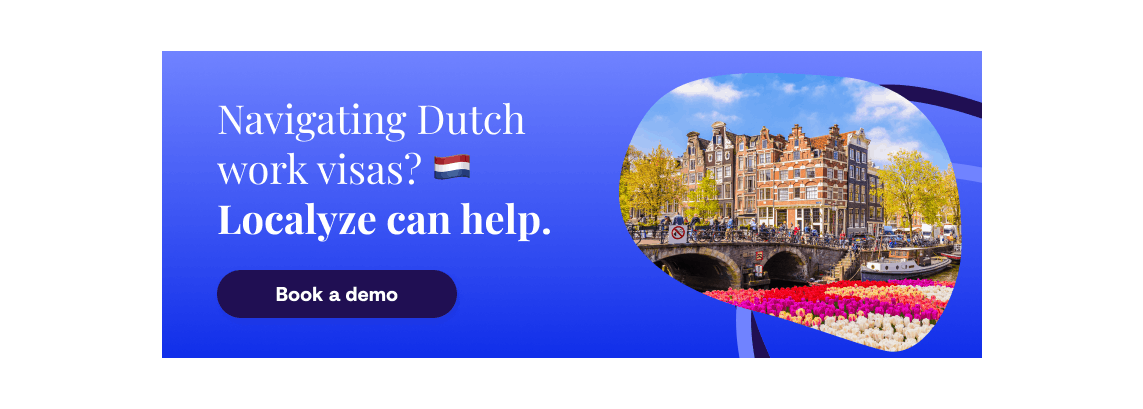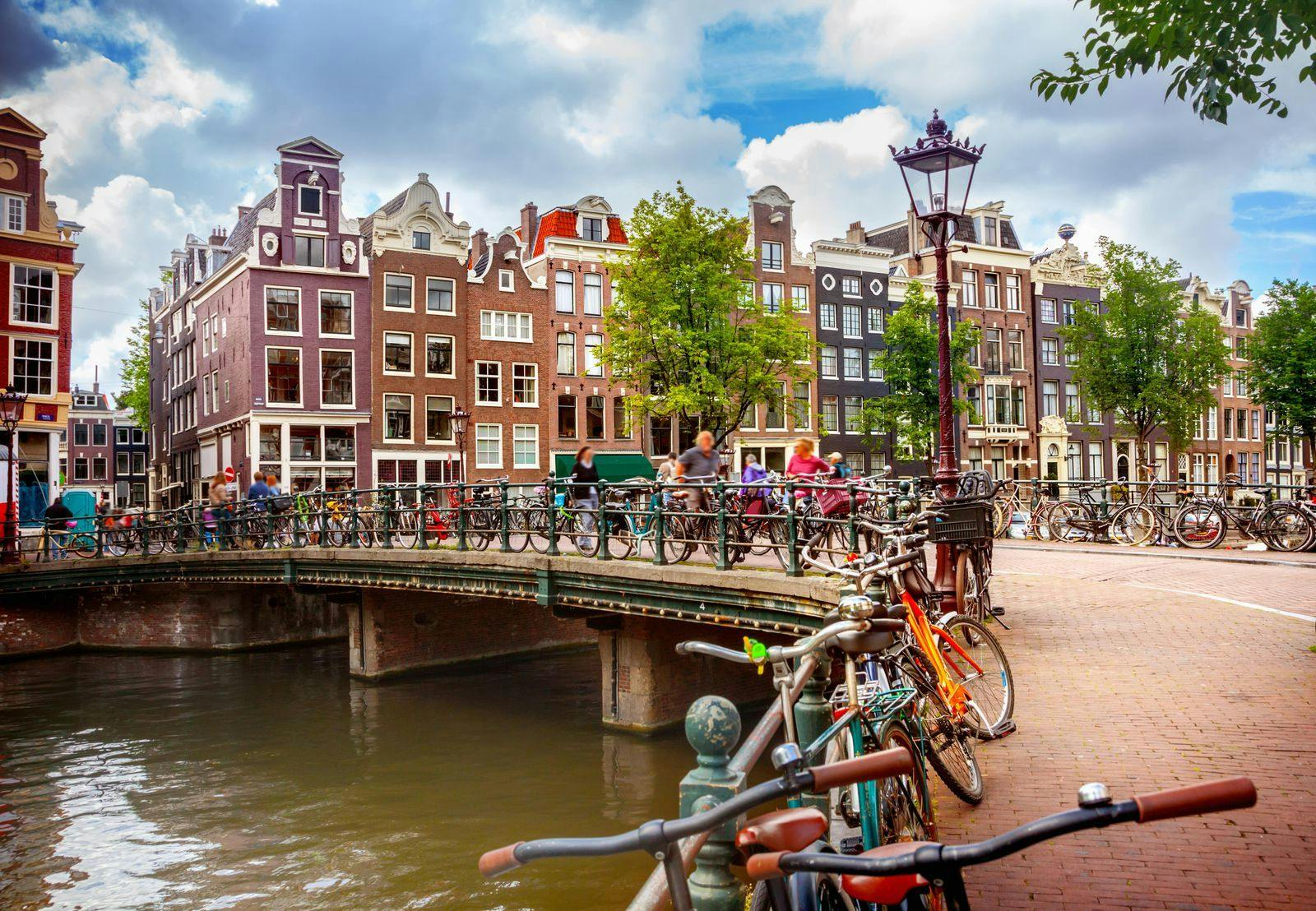The Netherlands is a beautiful European country that is attractive to many businesses and employees thanks to its high quality of life, low crime levels, and healthy work-life balance. If you run a business in the Netherlands and want to attract employees from across the globe, you need to understand how to get a work visa in the Netherlands for your employees. This quick guide will give you an overview of the application process and how you can support your employees.
Who needs a work visa in the Netherlands?
The rules surrounding who needs a work visa in the Netherlands vary based on a person's country of origin.
EU/EEA citizens
Citizens from other European Union countries or Switzerland are free to live and work in any other EU country. They do not need a work visa or residence permit to live or work in the Netherlands.
Non-EU/EEA citizens
If the employee you want to hire is not from an EU/EEA member state or from Switzerland, they may need a work visa or residence permit. This will depend on the length of their stay in the Netherlands.
- Stay for less than 90 days: If the employee will be working in the Netherlands for 90 days or less, then they need a short stay visa. In addition, you may need to apply for a work permit (tewerkstellingsvergunning or TWV) on their behalf.
- Stay for more than 90 days: If the employee will be working in the Netherlands for more than 90 days, they will need a residence permit and a work permit.
Sponsor a visa in the Netherlands
When hiring a foreign national in the Netherlands, it can be helpful to apply to be a sponsor. A sponsor is an organization or company interested in the arrival of a foreign national. There are multiple categories for sponsors. As an employer, you would apply under the "work” category.
For sponsorship, “work” is recognized as the following:
- Work for highly skilled migrants
- Working in paid employment
- Seasonal labour
- Gaining work experience
- Work for European Blue Card holders
- Intra-corporate transfer
Being recognized as a sponsor is not mandatory in most working situations. However, if you wish to hire a highly skilled migrant, it is mandatory.
You must submit your sponsorship application through the mail and pay the application fee. That fee is typically 4,212 euros. However, it could be less if you run a small business with fewer than 50 employees.
The IND must decide within 90 days. A positive decision means you are officially recognized as a sponsor and the Dutch government will list your company in the Public Register of Recognised Sponsors. If you get a negative decision, you can file an objection.
Benefits of being a sponsor
Applying to be an official sponsor has many benefits:
- The Immigratie-en Naturalisatiedienst (IND) processes your applications faster.
- You can use the online Business Portal to apply for residence permits.
- You will need fewer supporting documents with your applications.
Obligations of a sponsor
As the sponsor of any foreign nationals, you will have several obligations to both your employees and the Dutch government. These obligations include:
- Providing up-to-date information: You will need to notify the IND of all changes in any foreign national’s situation, such as no longer working for you, a change in address, or leaving the Netherlands.
- Keeping records: You must keep records of your employment of any foreign nationals for at least 5 years after you are no longer their sponsor.
- Duty of care: You must have a careful recruitment and selection process for foreign nationals.
- Return of the foreign national: You are responsible for the return of the foreign national to their home country after their employment with you ends.
Dutch residence permits for work
There are multiple types of residence and work permits available in the Netherlands. The type of permit your employees need will depend on the work that they do for you.
Knowledge and talent residence permits
- Highly skilled migrant residence permit: This type of residence permit is for employees in highly skilled jobs. These are positions that require a high level of education, such as a doctor, scientist, or researcher. There are salary requirements for this type of permit.
- Intra-corporate transferee residence permit: For this type of permit, you must be transferring a current employee from a branch outside the EU to a branch in the Netherlands.
- European Blue Card residence permit: This type of permit applies to highly skilled workers and has a salary requirement. It also makes it easier for employees to work in other EU countries.
- Residence permit for researchers: This permit only applies to researchers working under Directive (EU) 2016/801. In place of a salary, the researchers may receive a grant.
- Residence permit for essential start-up personnel: For this type of permit, you must run a start-up company in the Netherlands. Employees must have an essential role in building the start-up and receive a salary.
Residence permit for paid employment
Some paid employees in the Netherlands need just one permit, called the gecombineerde vergunning verblijf en arveid or the GVVA. This is a combination permit that covers both residency and work. It is a requirement for work in the following fields:
- International non-profit organizations
- Monastic/conventual order or missionaries
- Officiating minister or spiritual counsellor
- Arts and culture
- Supply of goods by a foreign company
- Supply of goods to a foreign company
- Intra-corporate transferee
When you hire someone that does not fit the GVVA requirements, you must apply for a paid employment residence permit from the IND along with a TWV from the Uitvoeringsinstituut Werknemersverzekeringen (UWV). Employment categories in this group typically include:
- Non-privileged military or civilian personnel
- Mass media correspondent
- Employees on a Dutch mining installation or seagoing vessel
- Employees under a headquarters agreement
After five continuous years of working in the Netherlands, an employee no longer needs a TWV. In this case, an employer only needs to apply for a paid employment residence permit.
How to apply for an employment permit in the Netherlands
As an employer, you must apply for either the single permit (GVVA) through the IND or an employment permit (TWV) through the UWV for your foreign national workers. If you are applying for a TMV, make sure your employee has a residence permit first. You also need to adhere to the terms of employment and make sure you have not violated any labor laws.
You must apply for the GVVA through the mail. There is an application fee of 345 euros and the IND must decide within 90 days. If you get a negative decision, you can file an objection.
The application process for a TMW can be long. The Dutch government recommends you collect all the required information from your employee before you start the process:
- Valid passport or travel ID
- Educational qualifications
- Two passport photos
- Criminal record check
- Confirmation of job offer
- Proof that the offered salary meets the income requirements
- Health insurance coverage
- Sponsorship declaration form if you are a non-recognized sponsor
These documents need to be legalized and translated into Dutch, English, French, or German.
You can apply for a work permit online. You will need to log into the employer portal.
- You will need eHerkenning with confidence level EH3 and an authorization to log in.
- When you do log into the employer portal, select ‘Apply for a work permit’ in the left menu.
- It can take up to 5 weeks to get a decision on the application.
Frequently Asked Questions
Here are some of the most frequently asked questions we receive surrounding Dutch residence permits and work visas in the Netherlands.
How do you change or renew a residence permit in the Netherlands?
If you already have a residence permit in the Netherlands, you may have to renew it after it expires. This applies to type II, type IV, type V, and Type EU/EEA permits. You can submit your application online as early as 3 months before your current residence permit expires. The application fee is 69 euros, and you will get a response within 8 weeks.
What happens if you’re caught working without a permit?
If the government finds out an employer has employed a non-EU national without receiving the proper visas and permits, the Inspectorate SZW can impose a fine of up to 8,000 euros. The employee can potentially get rejected for any future residence permit applications.
What happens if your application for a permit is denied?
If your application for a residence or work permit has been denied, you will receive an official government letter explaining the decision. If you want to object to the decision, you must do so in writing within four weeks. There will be an address to mail the objection in the letter.
What happens if you lose your job?
If you lose your job in the Netherlands as a foreign national, you are given a three-month transitional period to find new employment. However, if you are a highly skilled migrant worker considered “at fault” and get fired, you do not get the three-month search period. Those with a regular residence permit for employment get a three-month search period regardless of the reasons for termination.
If you cannot find suitable employment within three months, your residence permit will be withdrawn and you could face a residence gap.
The bottom line
Navigating the immigration, visa, and permit process in the Netherlands can be overwhelming and difficult. You have excellent non-EU nationals waiting to get hired, so you need to get this process right. You need professionals who work through these government processes every day.
Our team of experts here at Localyze is ready to help you through this process. Schedule a meeting with us today


